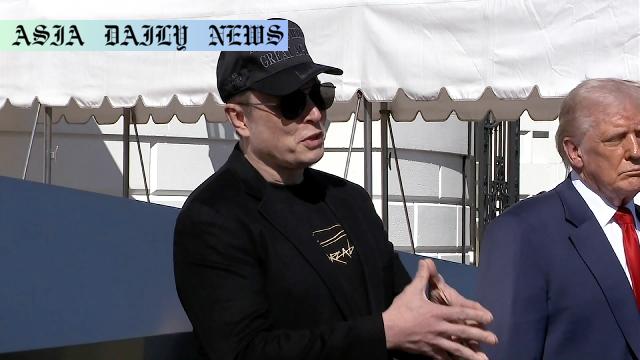Tesla CEO Elon Musk to double vehicle production in the US within the next two years, supported by Trump’s administration policies.
Tesla CEO Elon Musk announced plans to double vehicle production in the US.
Musk attributes this growth to supportive Trump administration policies.
The endorsement of Tesla by Trump raised ethical concerns.
Public backlash against Musk and Tesla is leading to protests and vandalism.

Tesla’s Vision for Doubling Production Capacity
Tesla CEO Elon Musk has committed to an ambitious plan of doubling the company’s vehicle production within the United States over the next two years. This announcement came during an event where Musk and US President Donald Trump addressed reporters in front of Tesla vehicles. Musk emphasized that this expansion initiative stems from the “great policies” of the Trump administration, showcasing his faith in American manufacturing and economic potential.
Elon Musk’s statement reflects the growing interplay between government policies and corporate decisions in America. Tesla looks set to leverage this partnership, paving the way for economic growth, job creation, and technological innovation. However, such close engagement brings its share of controversies and public scrutiny, especially as Tesla enjoys the explicit backing of one of the world’s most influential political leaders.
Trump’s Open Endorsement Sparks Controversy
President Trump’s statement endorsing Tesla marks an unusual moment in politics, as rarely do sitting presidents endorse specific consumer brands so publicly. Declaring Tesla and Musk as symbols of innovation and patriotism, Trump even expressed his interest in purchasing a Tesla car. This unprecedented endorsement has sparked debates among political analysts, with some seeing it as a commendable support for American industry while others criticize it as preferential treatment that blurs the lines between public administration and corporate interests.
Adding another contentious layer, Musk’s simultaneous leadership of the “Department of Government Efficiency” (DOGE) has drawn criticism amid government job cuts and spending reductions. Protesters argue that Musk’s policies disproportionately impact government workers, contradicting the job creation narrative promised by Tesla’s expansion plans. This duality has intensified public division on Musk’s leadership and Tesla’s ambitions.
Public Backlash and Protests Against Tesla
Not everyone is onboard with Tesla’s growth trajectory. Protests erupted in New York, with citizens rallying against the dismissal of government employees attributed to DOGE policies. Protesters view Musk’s corporate policies as detrimental to workers and symbolic of a broader trend of privatization that undermines public interest. Vandalism targeting Tesla showrooms and charging stations highlights the heightened emotions around this issue.
Visuals of protesters, including one depicting Musk attacking the Statue of Liberty, have gone viral, capturing the public mood. Critics argue that supporting Tesla is equivalent to endorsing Musk’s broader agenda, which many perceive as corporate-driven rather than people-focused. The backlash underscores the friction that arises when corporate growth intersects with political and social considerations.
Looking Ahead: Tesla’s Growth Amid Challenges
As Tesla gears up for its next growth phase, it faces immense opportunities coupled with significant challenges. The promise to double domestic production holds massive potential for job creation, technological advancement, and a reinforced American manufacturing presence. Yet, achieving this vision necessitates navigating public criticism, political debates, and operational hurdles. Musk and Tesla must engage with diverse stakeholders, balancing corporate goals with societal expectations to ensure sustainable growth.
Only time will tell whether this bold initiative will consolidate Tesla’s position as a global leader in electric vehicles or further amplify the divisions between its supporters and critics. Nevertheless, the unfolding developments affirm Tesla’s central role in shaping not just tech innovation but broader economic and political landscapes as well.
Commentary
Examining the Implications of Tesla’s Expansion
The announcement of Tesla doubling its production capacity in the United States within two years is both inspiring and polarizing. It underscores Elon Musk’s unwavering ambition and his ability to align Tesla’s corporate objectives with national priorities—a move that bolsters Tesla’s image as a pioneer in sustainable vehicle manufacturing. Doubling production within such a rapid time frame is undoubtedly ambitious, showcasing Tesla’s confidence in technological advancements and market demand.
However, there are legitimate concerns over the apparent intertwining of politics and corporate endorsements. President Trump’s direct support for Tesla not only raises ethical questions but also sets a precedent that may be difficult to reconcile in terms of governance. While it’s heartening to see government backing for homegrown innovation, such overt endorsements could blur the boundaries between public responsibility and corporate favoritism.
Public Sentiment Divided
The public outcry and protests shed light on the complexities of corporate governance amid societal expectations. It’s apparent that Tesla, as a brand synonymous with progress, is now facing backlash over Musk’s aggressive policies as the head of the Department of Government Efficiency. Layoffs and reduced government spending are adequate grounds for dissatisfaction, particularly among those directly affected. People protesting Tesla and Musk are not necessarily anti-innovation but seek accountability when policy decisions impact livelihoods.
This dichotomy of Tesla as both a beacon of innovation and a source of dissatisfaction reflects the challenges of balancing technological advancement with social responsibility. As leaders in innovation, Tesla and Musk now must establish mechanisms that not only create economic value but also address the legitimate concerns of their critics.
The Path Forward for Tesla and Musk
Musk must now take proactive steps to bridge the gap between his corporate vision and public expectations. Transparent communication, investments in community-building efforts, and equitable policies will be vital in regaining the trust of skeptical groups. While Tesla stands at the forefront of a global shift toward sustainable technology, its growth must resonate positively with all stakeholders, not just shareholders or political allies.
The next two years will be pivotal for Tesla, not just in terms of production numbers but also in demonstrating its capacity for responsible leadership. If Tesla can balance ambition with accountability, it has the potential to not only double its output but also strengthen its legacy as a transformative agent in the modern economy.


